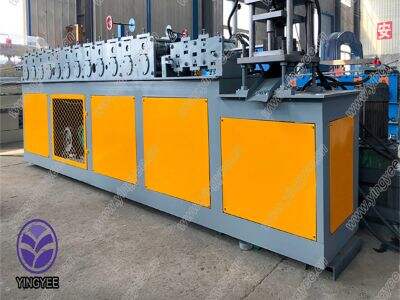Ფოლადის როლიკის ფორმირების პროცესში ერთ-ერთი ყველაზე მნიშვნელოვანი პარამეტრი არის როლიკის მასალის სიმაგრე. ამ სტატიაში განხილული იქნება მაღალი სიმაგრის მქონე როლიკების გამოყენების უპირატესობები ფოლადის როლიკის ფორმირებისას და იმის შესახებ, თუ როგორ აისახება როლიკის მასალის სიმაგრე პროდუქტის ხარისხზე. → ასევე მოვიხსენით, თუ როგორ შეიძლება როლიკის მასალის სიმაგრის არჩევანმა მაქსიმალურად გააუმჯობინოს ფოლადის როლიკის ფორმირების ოპერაციები და რატომ უნდა შევინარჩუნოთ როლიკის მასალის სიმაგრე როლის დახურვის მაშინა მასალაში გრძელვადიანი შედეგებისთვის.
Როლიკის მასალის სიმაგრის ეფექტი ფოლადის როლიკის ფორმირების პროცესში
Ეს არ არის დამოკიდებული როლიკის მასალის მაღალ ან დაბალ მაგრივებზე, არამედ მის წინააღმდეგობის უნარზე ჩაჭრას ან შეღწევას. GP: როდესაც ფორმირდება ფოლადი როლიკების გამოყენებით, მასალის მაგრივება იგივე მნიშვნელობისაა იმის გასაგებად, რამდენად კარგად მოხდება სასურველ ფორმაზე მისი დაქუცმა. რადგან უფრო მაგარი როლიკის მასალა უფრო მეტად აგრძელებს ცვეთას და დეფორმაციას, ვიდრე უფრო მაგრი მასალა, ასეთი ტიპის როლიკები უფრო მეტი დატვირთვის მქონე ფოლადის დასამუშავებლად შეიძლება გამოყენებულ იქნას.
Როლიკის მარგი მასალა შეიძლება სწრაფად იცვეთოს და მუდმივად დეფორმდეს, რაც დაბალი ხარისხის პროდუქტების წარმოებას იწვევს. მეორე მხრივ, თუ როლიკის მასალა ძალიან მაგრია, ეს შეიძლება გამოიწვიოს ფოლადზე ზედმეტი ცვეთა და გამოიწვიოს cracked ან სხვა დეფექტები. ამიტომ შესაბამისი მაგრივების არჩევანი тუბის როლის მაშინა მასალა საკმაოდ მნიშვნელოვანია ფოლადის როლიკის ფორმირებისთვის.
Ფოლადის როლიკის ფორმირება: უფრო მაგარი როლიკების მასალის უპირატესობები
Ფოლადის როლიკების წარმოებაში უფრო მყარი როლიკების მასალები ბევრ უპირატესობას იძლევა. უფრო მყარი მასალისგან დამზადებული როლიკები შეიძლება გრძელი ხანი გამოყენებულ იქნას მაღალი ჩანაცვლების სიხშირის პირობებში, რაც შედეგად იძლევა ნაკლებ შეჩერებას და დაკავშირებულ შემსვენებელ ხარჯებს. შესაბამისად, ფოლადის როლიკების წარმოება მთლიანობაში ნაკლებად ეფექტურია.
Მეორეს მხრივ, უფრო მტკიცე როლიკების მასალები უკეთ იძლევა წამოჭრის პროცესში აღმოჩენილ უფრო მაღალ წნევას და დატვირთვას, რაც უზრუნველყოფს ფოლადის უფრო ზუსტ ფორმას და ერთგვაროვნებას. ეს იწვევს უფრო ერთგვაროვან ნაწილების მიღებას უფრო ახლოესი დაშორებებით და უფრო გლუვ გარეგნობას მთლიანად.
Ბოლოს, უფრო მყარი როლიკების მასალები უფრო მედეგია ცვეთისა და დეფორმაციის მიმართ, ამიტომ ისინი როლის შურავლის როლის ფორმირების მაशინა ინარჩუნებენ თავიანთ ფორმას და ფუნქციონირებას გრძელი პერიოდის განმავლობაში. ეს კი გრძელვადიანობასთან ერთად უზრუნველყოფს სტაბილურობას და საიმედოობას ფოლადის როლიკების წარმომქმნელი მანქანის მიმართ.
Როგორ ზეგავლენას ახდენს როლიკის მასალის ხარისხი ფოლადის როლიკების წარმოების პროდუქის ხარისხზე
ფოლადის როლიკით ფორმების წარმოებისას, როლიკის მასალის მაგარი ბუნება პირდაპირ ზეგავლენას ახდენს საბოლოო პროდუქტის ხარისხზე. თუ როლიკის მასალა ძალიან მაგრია, შეიძლება მოხდეს მისი დეფორმაცია ან სიცური ცვეთა, რაც იწვევს ცხელწონილი ფოლადის არარეგულარულ ფორმასა და ზომების დეფექტებს. ამის შედეგად წარმოიქმნება ნაგვი და საჭირო ხდება ხელახლა დამუშავება, რაც იწვევს როგორც წარმოების ხარჯების, ასევე ნაგვის რაოდენობის გაზრდას.
Მეორე მხრივ, თუ როლიკის მასალა სიმკვრივით ძალიან მაგრია, შეიძლება გამოიწვიოს ფოლადზე დიდი ხახუნი და ზედაპირის დეფექტები ან cracks. ეს აზიანებს პროდუქტის სტრუქტურულ მთლიანობას და ხდის მას უფიტებელს მისი სათავადო გამოყენებისთვის. ამიტომ როლიკით ფორმირებისას როლიკის მასალის მაგრივის სრულყოფილი ბალანსი უნდა იყოს საუკეთესო ხარისხის მისაღებად.
Როლიკის მასალის მაგრივის შერჩევა ფოლადის როლიკით ფორმირების ოპერაციებში
Ფოლადის როლიკებისთვის სიმტკიცის სწორი არჩევანი მნიშვნელოვანია ფოლადის როლიკების ფორმირების ოპერაციების ოპტიმიზაციისთვის. მწარმოებლებს შეუძლიათ მოიპოვონ უმეტესი ეფექტურობა, პროდუქტიულობა და პროდუქტის ხარისხი, თუ არჩევანს გააკეთებენ როლიკის მასალის შესაბამის სიმტკიცეზე კონკრეტული ფოლადის ფორმირების მოთხოვნების მიხედვით.
Როლიკის მასალის სიმტკიცის არჩევანი დამოკიდებულია ფოლადის ტიპზე, ფოლადის სისქეზე და სიმტკიცეზე და სასურველ საბოლოო პროდუქტის ფორმაზე და განზომილებებზე. შედეგად, მნიშვნელოვანია, რომ ამ როლიკებში გამოყენებული მასალა დარჩეს გავლენის გარეშე იმ წნევისა და დატვირთვის მიმართ, რომლებიც წარმოიქმნება ფორმირების დროს, ხოლო ასევე შეინარჩუნოს სიზუსტე და ერთგვაროვნება.
Გარდა ამისა, როლიკების სიმტკიცე და მდგომარეობა უნდა შემოწმდეს და შეინარჩუნოს ხშირად. თუ ნებისმიერ სხვა ნაწილზე იქნება გამოვლენილი ცვეთა ან დეფორმაცია, უნდა მიექცეს ყურადღება დროულად, რათა თავიდან ავიცილოთ ავარია ხარისხის პრობლემების და ფოლადის როლიკების ფორმირების ოპერაციების შეჩერების შედეგად.
Რატომ არის მნიშვნელოვანი როლიკის მასალის სიმაგრე ფოლადის როლიკურ ფორმირებაში გრძელვადიანი შესრულებისთვის?
Ფოლადის როლიკური ფორმირების მადგრადობის გასაზრდელად გრძელი ხნის განმავლობაში, აუცილებელია როლიკის მასალის სიმაგრის შენარჩუნება. რეგულარული როლიკების შემოწმება, გაწმენდა და სმეხვარება ხანგრძლივობის გაზრდას უწყობს ხელს და აპირებს აბრაზიულ დეფორმაციას.
Ასევე, მნიშვნელოვანია გამოყენებული ან დაზიანებული როლიკების შეცვლა სწორი სიმაგრის ახალი როლიკებით, რათა შეინარჩუნოს პროდუქტის ხარისხი და წარმოების ეფექტიანობა. როლიკის მასალის სიმაგრის შეუნარჩუნებლობა იწვევს დამატებით ხარჯებს შეკეთებებზე, მეტი დრო იკარგება შეჩერების დროს და შემცირდება ფოლადის როლიკური ფორმირების მოწყობილობის ექსპლუატაციური ეფექტიანობა.
Მიუხედავად ყველაფრისა, როლიკის მასალის მაგარი ბურღვა ფოლადის როლიკების წარმოქმნის პროცესში მნიშვნელოვან ფაქტორს წარმოადგენს. ნებისმიერმა, ვისაც პოლიურეთანისგან დამზადებული როლიკები აქვს (სიაში შედის უმეტესობა მწარმოებლებისა), უნდა იცოდეს, რომ ისინი გადამყვან საწარმოში ყველაზე მნიშვნელოვან მომსახურებად საშუალებებს შორის არიან: მათი ეფექტური გამოყენება ამაღლებს პროდუქციის ხარისხს და უზრუნველყოფს მოწყობილობის გრძელვადიან მუშაობას. YINGYEE-მ სპეციალურად შეარჩია როლიკის მასალის მაგარი ბურღვის მაჩვენებელი, რათა უზრუნველყოს შესაბამისი წარმოების ეფექტიანობა, საიმედოობა და ხარისხის კონტროლი ფოლადის როლიკების წარმოქმნის პროცესში.
Შინაარსის ცხრილი
- Როლიკის მასალის სიმაგრის ეფექტი ფოლადის როლიკის ფორმირების პროცესში
- Ფოლადის როლიკის ფორმირება: უფრო მაგარი როლიკების მასალის უპირატესობები
- Როგორ ზეგავლენას ახდენს როლიკის მასალის ხარისხი ფოლადის როლიკების წარმოების პროდუქის ხარისხზე
- Როლიკის მასალის მაგრივის შერჩევა ფოლადის როლიკით ფორმირების ოპერაციებში
- Რატომ არის მნიშვნელოვანი როლიკის მასალის სიმაგრე ფოლადის როლიკურ ფორმირებაში გრძელვადიანი შესრულებისთვის?

 EN
EN
 AR
AR BG
BG DA
DA NL
NL FR
FR DE
DE EL
EL IT
IT KO
KO PT
PT RO
RO RU
RU ES
ES TL
TL ID
ID SR
SR SL
SL UK
UK VI
VI GL
GL HU
HU TR
TR FA
FA MS
MS GA
GA CY
CY MK
MK AZ
AZ KA
KA BN
BN BS
BS LA
LA MN
MN NE
NE MY
MY KK
KK UZ
UZ KY
KY